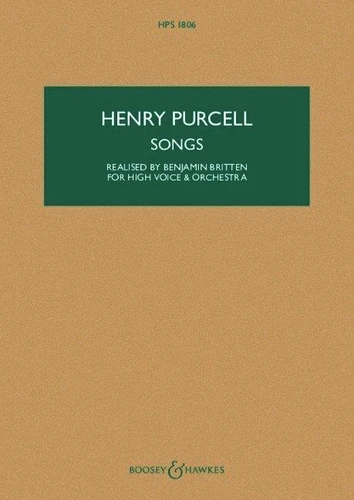Songs. HPS 1806, high voice and orchestra
Par : ,Formats :
Actuellement indisponible
Cet article est actuellement indisponible, il ne peut pas être commandé sur notre site pour le moment. Nous vous invitons à vous inscrire à l'alerte disponibilité, vous recevrez un e-mail dès que cet ouvrage sera à nouveau disponible.
- FournisseurSCHOTT MUSIC
- EAN9781835680469
- Réf. fournisseurBH 15074
- Dimensions18,5 cm × 26,0 cm × 0,0 cm
- Poids0.215 kg
- Nb. de pages76
Résumé
The music of Henry Purcell formed a major influence across Britten's output. The numerous editions of Purcell housed in Britten and Pears's Library and Archive in Aldeburgh indicate the lasting importance for both men of his music. Among these editions are the 1698 and 1702 printings of Orpheus Britannicus, the two-volume song collection published by Henry Playford after the composer's death. The many Purcell realisations Britten produced, with vocal parts edited by Pears, were a popular feature of their recitals throughout their performing career.
The Suite of Songs from Orpheus Britannicus dates from 1946, and was prepared for a recital tour of the Netherlands. The Three Songs followed in 1963 in connection with a 'Festival of British Musical Art' organised by the British Council, a cultural exchange between the United Kingdom and the USSR. Dr Nicholas Clark, Librarian at the Red House, Aldeburgh, comments that Britten's realisations were not intended as definitive but were the result of a mid-twentieth century reading of Purcell, following modern rather than authentic instrumental scoring.
The realisations originate from a diversity of contexts, ranging from works written for celebratory occasions to those composed for the theatre. Informing or reminding audiences of Purcell's genius lay at the heart of the realisations and Britten's key aim was to draw awareness to a vital musical heritage. Instrumentation : high voice and orchestra
The Suite of Songs from Orpheus Britannicus dates from 1946, and was prepared for a recital tour of the Netherlands. The Three Songs followed in 1963 in connection with a 'Festival of British Musical Art' organised by the British Council, a cultural exchange between the United Kingdom and the USSR. Dr Nicholas Clark, Librarian at the Red House, Aldeburgh, comments that Britten's realisations were not intended as definitive but were the result of a mid-twentieth century reading of Purcell, following modern rather than authentic instrumental scoring.
The realisations originate from a diversity of contexts, ranging from works written for celebratory occasions to those composed for the theatre. Informing or reminding audiences of Purcell's genius lay at the heart of the realisations and Britten's key aim was to draw awareness to a vital musical heritage. Instrumentation : high voice and orchestra
The music of Henry Purcell formed a major influence across Britten's output. The numerous editions of Purcell housed in Britten and Pears's Library and Archive in Aldeburgh indicate the lasting importance for both men of his music. Among these editions are the 1698 and 1702 printings of Orpheus Britannicus, the two-volume song collection published by Henry Playford after the composer's death. The many Purcell realisations Britten produced, with vocal parts edited by Pears, were a popular feature of their recitals throughout their performing career.
The Suite of Songs from Orpheus Britannicus dates from 1946, and was prepared for a recital tour of the Netherlands. The Three Songs followed in 1963 in connection with a 'Festival of British Musical Art' organised by the British Council, a cultural exchange between the United Kingdom and the USSR. Dr Nicholas Clark, Librarian at the Red House, Aldeburgh, comments that Britten's realisations were not intended as definitive but were the result of a mid-twentieth century reading of Purcell, following modern rather than authentic instrumental scoring.
The realisations originate from a diversity of contexts, ranging from works written for celebratory occasions to those composed for the theatre. Informing or reminding audiences of Purcell's genius lay at the heart of the realisations and Britten's key aim was to draw awareness to a vital musical heritage. Instrumentation : high voice and orchestra
The Suite of Songs from Orpheus Britannicus dates from 1946, and was prepared for a recital tour of the Netherlands. The Three Songs followed in 1963 in connection with a 'Festival of British Musical Art' organised by the British Council, a cultural exchange between the United Kingdom and the USSR. Dr Nicholas Clark, Librarian at the Red House, Aldeburgh, comments that Britten's realisations were not intended as definitive but were the result of a mid-twentieth century reading of Purcell, following modern rather than authentic instrumental scoring.
The realisations originate from a diversity of contexts, ranging from works written for celebratory occasions to those composed for the theatre. Informing or reminding audiences of Purcell's genius lay at the heart of the realisations and Britten's key aim was to draw awareness to a vital musical heritage. Instrumentation : high voice and orchestra













